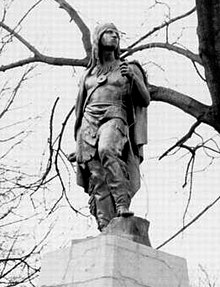Captain Pipe
| Captain Pipe | |
|---|---|
| Hopocan, Konieschquanoheel | |

Statue of Hopocan (Captain Pipe) in Barberton, Ohio
|
|
| Lenape, Wolf Clan leader | |
| Preceded by | Custaloga |
| Personal details | |
| Born | c. 1725? or 1740 |
| Died | c. 1818? |
| Relations | Uncle, Custaloga |
| Children | Son, Captain Pipe, and other children |
Captain Pipe (c. 1725? – c. 1818?) (Lenape), called Konieschquanoheel and also known as Hopocan, was an 18th-century chief of the Algonquian-speaking Lenape (Delaware) and a member of the Wolf Clan. He was a warrior and by 1773 succeeded his maternal uncle Custaloga as chief, part of a group that had moved from Pennsylvania to Ohio around the time of the French and Indian War.
Although Hopocan tried to stay neutral during the American Revolutionary War, after many of his family and people were killed in American raids, he allied with the British. After the war, he moved his people fully into Ohio Country. He made treaties with the Continental Congress to try to protect Lenape land. American settlers continued to encroach on his people and territory. In 1812 he moved with his people westward into present-day Indiana, where some accounts say he died. By 1821, most of the Lenape removed to Kansas, which was considered part of Indian Territory. They were under pressure from the United States to remove from all areas east of the Mississippi River.
In Lenape culture, people did not share their real names, because it could give spiritual power to enemies. In addition, individuals were often given new names, or nicknames, at different periods of their lives, particularly to mark life passages, such as reaching manhood. Konieschquanoheel (meaning "Maker of Daylight") was born about 1725 or 1740; this was his real name. His "public" name was Hopocan (meaning tobacco pipe). Because of the translated meaning and his status as a chief, the British called him Captain Pipe. This name was documented in the colonial historical records.
Hopocan was born into the Wolf Clan of his mother, for the Lenape have a matrilineal kinship system of descent and inheritance. In this system, his mother's eldest brother was more important in her children's lives in the clan than their biological father, from another clan. The uncle served especially as a male mentor to boys, bringing them into tribal male society. Little is known of Hopocan's early years. He was probably born near the Susquehanna River in Pennsylvania. His maternal uncle was Chief Custaloga, whom he later succeeded as hereditary chief, according to the matrilineal kinship rules. Captain Pipe likely spent his early years either at Custaloga's Town, along French Creek in Mercer County. He may also have lived at his uncle's other main village, Cussewago, at the present site of Meadville in Crawford County.
...
Wikipedia
